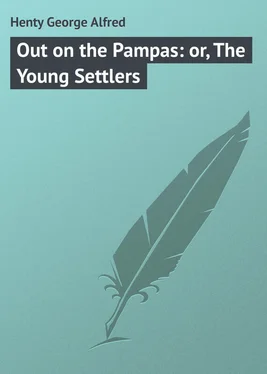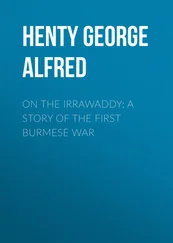George Henty - Out on the Pampas - or, The Young Settlers
Здесь есть возможность читать онлайн «George Henty - Out on the Pampas - or, The Young Settlers» — ознакомительный отрывок электронной книги совершенно бесплатно, а после прочтения отрывка купить полную версию. В некоторых случаях можно слушать аудио, скачать через торрент в формате fb2 и присутствует краткое содержание. Жанр: foreign_prose, foreign_children, на английском языке. Описание произведения, (предисловие) а так же отзывы посетителей доступны на портале библиотеки ЛибКат.
- Название:Out on the Pampas: or, The Young Settlers
- Автор:
- Жанр:
- Год:неизвестен
- ISBN:нет данных
- Рейтинг книги:5 / 5. Голосов: 1
-
Избранное:Добавить в избранное
- Отзывы:
-
Ваша оценка:
- 100
- 1
- 2
- 3
- 4
- 5
Out on the Pampas: or, The Young Settlers: краткое содержание, описание и аннотация
Предлагаем к чтению аннотацию, описание, краткое содержание или предисловие (зависит от того, что написал сам автор книги «Out on the Pampas: or, The Young Settlers»). Если вы не нашли необходимую информацию о книге — напишите в комментариях, мы постараемся отыскать её.
Out on the Pampas: or, The Young Settlers — читать онлайн ознакомительный отрывок
Ниже представлен текст книги, разбитый по страницам. Система сохранения места последней прочитанной страницы, позволяет с удобством читать онлайн бесплатно книгу «Out on the Pampas: or, The Young Settlers», без необходимости каждый раз заново искать на чём Вы остановились. Поставьте закладку, и сможете в любой момент перейти на страницу, на которой закончили чтение.
Интервал:
Закладка:
‘Why, Mrs. Hardy,’ he said as they landed, ‘you hardly look a day older than you did when I last saw you – let me see – fourteen years ago, just as this big fellow was beginning to walk. And now, if you please, we will be off as soon as we can, for my estancia is fifteen miles away. I have made the best arrangements I could for getting out; but roads are not a strong point in this country, and we seldom trust ourselves in wheeled vehicles far out of the town. You told me in your letters, Hardy, that the young people could all ride. I have horses in any number, and have got in two very quiet ones, with side-saddles, which I borrowed from some neighbours for your girls; but if they prefer it, they can ride in the trap with Mrs. Hardy.’
‘Oh no, please,’ Maud said; ‘I had much rather ride.’
Ethel said nothing, and her mamma saw that she would rather go with her. Accordingly, Mrs. Hardy, Ethel, Sarah, and some of the lighter bags were packed into a light carriage, Mr. Thompson himself taking the reins, as he said he could not trust them to any one but himself. Mr. Hardy, the boys, and Maud mounted the horses prepared for them, and two of Mr. Thompson’s men stowed the heavier trunks into a bullock-cart, which was to start at once, but which would not reach the estancia until late at night.
As the party rode through the town, they were struck with the narrowness and straightness of the streets, and at the generally European look of everything; and Mr. Thompson told them that nearly half the population of Buenos Ayres are European. The number of people upon horseback also surprised our young travellers; but horses cost only thirty shillings or two pounds, and grass is so abundant that the expense of their food is next to nothing; consequently every one rides, – even shepherds look after their sheep on horseback. The horses seemed very quiet, for in front of most of the offices the horses of the merchants could be seen fastened by a head rope to a ring, grooms not being considered a necessity.
Once out the town, the riding horses broke into a canter; for the road was so good that the horses in the light carriage were able to go along at full speed. As they proceeded, they passed many houses of the rich merchants of the place, and all were charmed with the luxuriance and beauty of the gardens. Orange and lemon trees scented the air with their delicious perfumes; bananas, tree ferns, and palms towered above them; lovely butterflies of immense size, and bright little humming-birds, flitted about among a countless variety of flowers. The delight of the young ones was unbounded.
Presently they left the mansions and gardens behind, and drove out fairly into the country.
Upon either side the plains stretched away as far as the eye could reach, in some parts under the plough, but far more generally carpeted with bright green grass and many-coloured wild-flowers. Everywhere could be seen droves of horses and cattle, while dotted here and there over the plain were the estancias of the proprietors.
It was a most delightful ride. The horses went very quietly, but the boys found, to their surprise, that they would not trot, their pace being a loose, easy canter. The last five miles of the distance were not so enjoyable to the party in the carriage, for the road had now become a mere track, broken in many places into ruts, into which the most careful driving of Mr. Thompson could not prevent the wheels going with jolts that threatened to shake its occupants from their places, and they felt as if every bone in their bodies were broken by the time they drew up at their host’s estancia.
Here Mrs. Thompson came out to greet them. She had been a great friend of Mrs. Hardy in their young days, and great was their pleasure at their again meeting after so long a separation. Mr. Thompson had already explained that his wife would have come over to meet them, but that at the time he had left home it was not known that the Barbadoes had arrived. She was due, and, as a measure of precaution, the horses and cart had for the last two days been in readiness, but the exact date of her arrival was of course uncertain.
Mr. Thompson’s estancia was a large and picturesque building. It was entirely surrounded by a wide verandah, so that at all hours of the day relief could be obtained from the glare of the sun. In front was an extensive garden; and as Mr. Thompson had made it one of his first objects when he built his house to plant a large number of tropical trees and shrubs, these had now attained a considerable size, and afforded a delicious shade. At a short distance behind the house were the houses of the men, and the corrals, or enclosures, for the cattle.
The interior was handsomely furnished in the European style, except that the floors were uncarpeted, and were composed of polished boards. Everywhere were signs that the proprietor was a prosperous and wealthy man. Mr. Thompson had only one son, a lad of about the same age as Charles Hardy. To his care Mrs. Thompson now assigned the boys, while she conducted Mrs. Hardy and her daughters to their rooms.
In half an hour the party re-assembled at dinner, to which they all did ample justice, for their long row and ride had given them the keenest of appetites. They were waited upon by an Italian man-servant; and Mrs. Thompson said that there were a good many of this nation in Buenos Ayres, and that, although they were not considered good hands for rough work, they made excellent servants, many of them having been waiters in hotels or stewards on board ship before coming out.
During dinner the conversation turned chiefly upon English friends and affairs, and upon the events of the voyage. After it was over, George Thompson proposed to the boys to take a stroll round the place before it became dark. The gentlemen lit their cigars and took their seats under the verandah; and the two ladies, with Maud and Ethel, went out into the garden. The conversation of Mr. Hardy and his friend turned, of course, upon the country, its position and prospects, and upon the advantage which the various districts offered to new-comers. Presently the dusk came on, followed rapidly by darkness, and in half an hour Ethel came to summon them to tea. The boys had already come in, and were full of delight at the immense herds of cattle they had seen. As they sat down to the tea-table, covered with delicate English china, with a kettle over a spirit-lamp in the centre, and lit with the subdued light of two shaded moderator lamps, Maud said, ‘It is not one bit like what I expected, papa, after all you have told us about hardships and working; it seems just like England, except the trees and flowers and butterflies.’
‘Do not be afraid, Maud,’ her father said, laughing, – for her voice had a tinge of disappointment in it, – ‘you won’t be cheated out of your hardship and your work, I promise you. Mrs. Thompson will tell you that it was a very different sort of place when she first came here.’
‘Yes, indeed,’ Mrs. Thompson said, smiling; ‘this was considered a very lonely place when we first settled here. We had a little hut with two rooms, and it was more than six months before I could get a woman servant to come out, and then it was only one of our shepherds’ wives, who knew nothing of cooking, and who was only useful in drawing the water and sweeping the floors. In time the country became more settled, and there are stations now sixty or seventy miles beyond us.’
The next week was spent in riding over the estate, which consisted of four square leagues, – that is to say, was six miles each way, – and in examining the arrangements of the enclosures for the cattle. At the end of that time Mr. Hardy started on a tour of inspection through the provinces most likely to suit, provided with numerous letters of introduction from his host. While he was away the boys were to assist upon the estate, and to accustom themselves to the work and duties of the life they were to lead. Into this they entered with the greatest zest, and were in the saddle from morning till night, getting more and more sunburnt from constant exposure, until, as Mr. Thompson told them, they looked like two young guachos. The guachos are the natives of the country. They are fine-looking men, with Spanish faces. Their dress is very picturesque. They wear loose calzoncillas or drawers, worked and fringed round the bottom. Above this is a sort of shawl, so arranged that it has the effect of very loose trousers. These shawls are generally of bright colours, woven in stripes, and sometimes of black cloth edged with scarlet. The white calzoncillas show below this garment, and above a coloured flannel shirt is worn. The boots are long and are made of undressed leather. They wear a broad leathern belt, with pockets in it; in this a knife, too, is always stuck. Upon fête days they come out with gay silver ornaments upon themselves and their horse-trappings. Their saddles are very clumsy and heavy, and are seldom used by Europeans, who, as Mr. Hardy had done, generally bring English saddles from home. After an absence of a month, Mr. Hardy returned with the welcome news that he had made his choice, and had bought at the public auction a tract of four square leagues, upon a river some twenty miles to the south of the town of Rosario, and consequently only a few days’ journey from Buenos Ayres. Mr. Thompson looked a little grave when he heard the location of the property, but he only said that he was very glad that his friend had fixed upon a spot which would make it easy for the families to see something of each other. After the first greetings were over, Mr. Hardy proceeded to satisfy the curiosity of his hearers as to the new property.
Читать дальшеИнтервал:
Закладка:
Похожие книги на «Out on the Pampas: or, The Young Settlers»
Представляем Вашему вниманию похожие книги на «Out on the Pampas: or, The Young Settlers» списком для выбора. Мы отобрали схожую по названию и смыслу литературу в надежде предоставить читателям больше вариантов отыскать новые, интересные, ещё непрочитанные произведения.
Обсуждение, отзывы о книге «Out on the Pampas: or, The Young Settlers» и просто собственные мнения читателей. Оставьте ваши комментарии, напишите, что Вы думаете о произведении, его смысле или главных героях. Укажите что конкретно понравилось, а что нет, и почему Вы так считаете.












